When you pay almost $30k for a luxury-sport sedan, you expect better performance than you’d get out of a $20k economy sedan.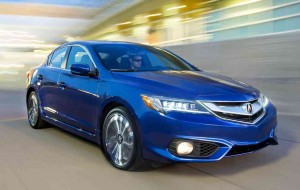
Acura’s ILX – the upmarket cousin of the Honda Civic – didn’t deliver it when it was launched two years ago as an all-new 2013 model.
Well, not with its standard engine, at any rate. Just 150 hp out of 2.0 liters.
You did get very good gas mileage (24 city, 35 highway). Which was almost as good as the mileage you’d get out of the Civic’s 1.8 liter, 140 hp four (30 city, 39 highway).
But you also got a Civic-like nine second 0-60 timeslip.
That’s acceptable in a $20k Honda.
Not so much in a nearly $30k Acura.
The fix was easy. Lose the 2.0 engine.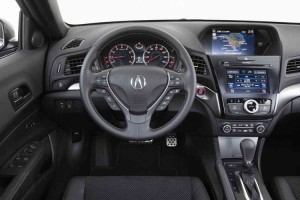
Done.
It’s gone.
The formerly optional 2.4 liter engine (which is basically the high-performance Civic Si’s engine) is now the standard engine. Result? The ILX is quicker than rivals like the Mercedes CLA250, Audi A3 and Lexus IS250.
And, it costs less.
Not just than they do.
Less than last year’s ILX, too.
Just like that, things got a lot more interesting!
WHAT IT IS
The ILX is Acura’ entry-level, compact luxury-sport sedan. It derives from the Civic, but now has more in common with the high-performance Civic Si.
Base price is $27,900.
A top of the line model with the A-Spec performance/handling package and the Technology package, which includes adaptive cruise control and a semi-autonomous steering function (more on that below) as well as GPS and a larger LCD display monitor lists for $34,890.
The ILX competes with other compact entry-level luxury sport sedans like the Mercedes CLA250, the Audi A3 and the Lexus IS250.
In addition to the formerly optional 2.4 liter engine becoming standard equipment, the ’16 ILX also comes standard with a new eight-speed automated manual transmission (not available in the Civic Si, by the way).
The ILX’s exterior and interior have been updated, too – and there are several new electronic/safety features available, such as lane keep assist, forward collision mitigation and a multi-view back-up camera.
There’s also a price drop.
Acura is asking less for the ’16 with the 2.4 engine ($27,900) than they were for the ’15 with this engine ($29,350), a difference of about $1,500.
Performance now matches the price – and outclasses pricier rivals like the Benz CLA250 ($31,500-$33,550), the Audi A3 ($30,900-$42,050) and the Lexus IS250 ($36,550-$39,085).
Fuel efficiency is actually better this year than it was last year – despite the power/performance increase.
Much more practical (and a much better deal) than the Mercedes CLA250 – which has seven inches less legroom in the second row.
A steal on wheels compared with the $36k to start Lexus IS.
WHAT’S NOT SO GOOD
Manual transmission has been dropped.
Not as dramatic-looking as the stunning Mercedes CLA.
AWD not available (it’s optional in the CLA 250, A3 and IS250).
The sore-gummed (and Civic-sourced) 2.0 engine has been dropped – not because it was a bad engine, but because it was an underpowered engine. Its replacement – sourced from the Civic Si – is much more appropriate to the car.
Instead of 150 hp and nine seconds to 60 – weakest power/performance in the class – you’ll get 2.4 liters, 201 hp – and 0-60 in about 5.8 seconds.
This is best in class – and not just by the stopwatch.
The Acura beats the A3 1.8T at the pump, too. Its standard 1.8 liter four produces 31 fewer hp and the car takes 7.2 seconds to get to 60 – but only manages 23 city, 33 highway vs. 25 city, 36 highway for the ILX.
The Benz CLA250 edges out the Acura gas mileage-wise, but just barely. It rates 25 city, 36 highway – and isn’t as quick (and is $3,600 more to start).
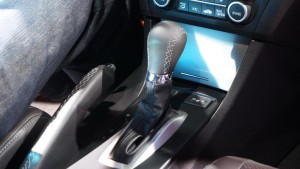 You may be wondering why the ’16 ILX with the now-standard 2.4 engine is quicker than the ’15 ILX with the same (but previously optional) engine. It’s because of the different transmission that’s paired with the 2.4 engine for 2016.
You may be wondering why the ’16 ILX with the now-standard 2.4 engine is quicker than the ’15 ILX with the same (but previously optional) engine. It’s because of the different transmission that’s paired with the 2.4 engine for 2016.
The six-speed manual that was mandatory with the 2.4 engine last year has been dropped in favor of a new eight-speed automated manual that’s now the standard (and only available) transmission.
The automated manual is a two-fer:
Better performance numbers than with the six-speed manual, due to perfectly timed (by the computer) shifts as well as tighter gear spacing due to the additional gears in the box. And better mileage, due to the superior efficiency of the eight-speed box vs. a conventional manual.
The difference is not small.
Last year’s ILX with the 2.4 engine and six-speed manual rated 22 city, 31 highway – respectable, but not spectacular (and much less than the spectacular 26 city, 38 highway delivered by the Benz CLA).
The new ILX notches the city number up by 3 MPG – and by 5 on the highway – without any loss of power and with an improvement in the car’s performance. This is why not-automated manuals are fading away. Even an F1 driver can’t consistently outshift one of these very clever computer-shifted automated manuals.
It’s why rival cars like the CLA250 and the A3 also have them.
Something the ILX does not have, though, is all-wheel-drive.
It’s actually one of the few cars in this class that doesn’t at least offer it (both the CLA and the A3 do). This is a particularly odd omission given Acura’s pretty aggressive marketing of its SH-AWD (super handling) system in models like the TLX and MDX. The “why” may have to do with fuel efficiency (and price) concerns. Adding AWD would slow the ILX down, make it thirstier – and more expensive. For some sense of this, the AWD-equipped Mercedes CLA250 starts at $33,500 and its mileage drops from the FWD version’s class best 26 city/38 highway) to a so-so 24 city, 32 highway.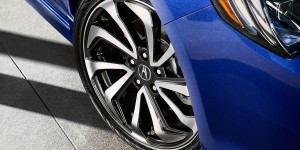
The wild card in this class is the A3 TDI. It’s the only diesel-engined car in the class – and the only car in the class capable of 43 MPG on the highway (and 31 in city driving).
It’s also a not-bad deal at $33,200 to start.
But, it’s slow – two second and then some behind the ILX, 0-60.
The Civic Si-sourced 2.4 engine’s war song is one of this car’s best features. It spins like a two-stroke to 7,000-plus RPM before each gear change under WOT.
It’s a very different sound (and sensation) vs. the turbocharged fours in the competition’s cars – reflecting a different approach to making power. The turbo engines base theirs on boost while the Acura relies on flow. They make their power (and torque) much lower in the powerband: 5,500 RPM for the CLA 250’s turbo 2.0 and 4,500 for the Audi’s turbo 1.8 – vs. a screaming 6,800 RPM for the VTEC Honda (oops, Acura).
It’s the difference between a Hayabusa – and a Harley.
Well, maybe not that extreme.
The Benz and Audi’s turbo engines are designed to produce big torque numbers (258 ft.-lbs. at just 1,250 RPM for the CLA; 200 ft.-lbs. at 1,600 for the A3 1.8T) in the lower and mid-ranges, to give the cars relaxed but powerful-feeling acceleration. The Acura’s free-breathing (and higher revving) naturally-aspirated engine is designed to practically beg for hammer time, the eight-speed transmission in Sport mode (which automatically drops it down two gears and really cinches up the shifts), the tach needle sweeping to the limiter at somewhere just south of 7,000 on the tach. If you’ve driven other VTEC Honda/Acura hot rods like the S2000 and – yes – the NSX – the experience will be very familiar.
And, distinctive.
Some will lament the loss of the shifted-by-you six-speed manual. But drive the car before you set your opinion in cement.
Some automated manuals are beset by sluggishness coming off the line – due to the absence of a torque converter in most of them. Or they shift weirdly sometimes – for example, jumping ahead too many gears on a downhill stretch.
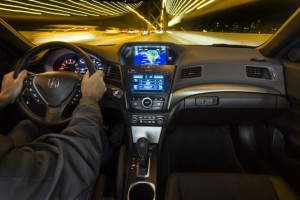 The ILX’s eight-speed does everything right – all the time. In Sport mode, you get dead-on (and rev-matched) downshifts, lightning quick upshifts coming out of the corners (but not in the middle of the corner) and (when you disengage Sport mode) immediate quiet and calm. The revs fall, the tach needle settles down. Higher, more fuel-conserving gears are engaged.
The ILX’s eight-speed does everything right – all the time. In Sport mode, you get dead-on (and rev-matched) downshifts, lightning quick upshifts coming out of the corners (but not in the middle of the corner) and (when you disengage Sport mode) immediate quiet and calm. The revs fall, the tach needle settles down. Higher, more fuel-conserving gears are engaged.
You trundle along, almost Camry-style.
This Dr. Jekyll and Mr. Hyde quality suits. And either way, you’ll be impressed by how little fuel this thing uses. In Mr. Hyde mode, I averaged 28.5 MPG. That’s with the transmission in Sport, full-throttle runs at every opportunity.
In Drive, I averaged 33.7 MPG – almost four MPG better than the EPA’s estimated average for this car.
Subjectively, the ILX strikes me as being in between the supermodel-in-a-thong Mercedes CLA and the still-holding-it-together housewife in a one-piece A3. The first’s an amazing looker – the second still looks good.
This actually jibes with the objective stuff – physical dimensions (especially allocation of space inside).
The Benz, like a supermodel in a thong, is not very practical. Though long and lean (every young man’s dream) it has a cripplingly cramped back seat. Just 27.1 inches of legroom back there (vs. 34 in the ILX and 35.1 in the A3). The Benz’s back seat is effectively unusable by adults who aren’t Little People.
Both the ILX and the A3 have serviceable back seats.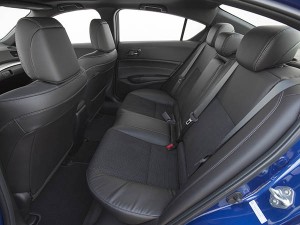
But the Audi’s trunk is tiny – just 10 cubic feet vs. 12.3 for the ILX and – oddly – 13.1 for the Mercedes. The CLA has more room for cargo than people. See that point about the supermodel in a thong.
Arguably – because objectively – the ILX is the most balanced of the three. The Audi’s smaller overall size (it’s just 175.4 inches long overall vs. 181.9 for the Acura and 182.3 for the CLA250) forces compromises (see the tiny tiny trunk). The Mercedes – being the longest of the three – ought to have the most room in both rows and in the trunk – but it sacrifices function for the sake of form.
The Acura is slightly smaller than the Mercedes, slightly bigger than the Audi – and has almost as much legroom in the second row as the Audi (and seven inches more than the Benz) without leaving you with a purse-sized trunk.
Noteworthy design features include sport seats with upper shoulder “wing” bolsters ; these provide an additional measure of support as well as comfort. The seats are top-drawer – as comfortable as Nissan’s “zero gravity” chairs but with the lateral support you don’t get with the Nissan’s otherwise best-in-the-business chairs.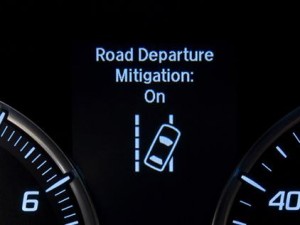
Also worth a mention is the ILX’s unique semi-self-steering option. It’s called Lane Keep Assist (LKAS) and when engaged, the car can almost steer itself. On a straight road – or one with gentle radius curves – it actually will steer itself. Cameras in the nose track the painted lines to your left and (hopefully) right and use this data to orient the car. Servos steer left or right as needed to maintain heading and course. You can literally take your hands off the wheel and let the car take over – within limits. If the painted lines in the road are faded or broken or the curve is too sharp, the system can’t hold the line and it’s up to you to make sure the car doesn’t wander off the road or into the opposing lane of traffic.
Technically, LKAS is an assist – not self-steering. It’s supposed to just decrease steering effort. But the fact is the car can – to a degree – steer itself. Acura is the first major car company to offer this preview of things to come. Drive the ILX (or rather, let the ILX drive itself) and you will be among the first to sample the almost-here autonomous car.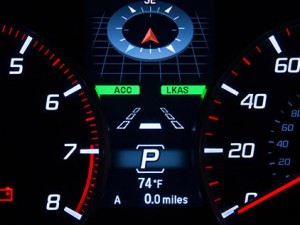
All the entrants in this class are marketed as luxury-sport sedans – but the Acura is the sportiest of them.
The large motorcycle-style analog gauges (8,000 RPM tach to your left and 160 MPH speedo to its right) are – like the VTEC 2.4 engine – very Integra GS-R esque.
They really ought to make a coupe version of this thing.
And – what the hell – offer it with the six-speed manual.
THE REST
For years, Acura was at something of a disadvantage relative to other luxury car brands (especially German luxury car brands) because Acuras were on the wrong side of the front-wheel-drive/rear-wheel-drive divide.
Front-wheel-drive was perceived by many as a fundamentally economy-car layout.
Or at least, not a premium car layout.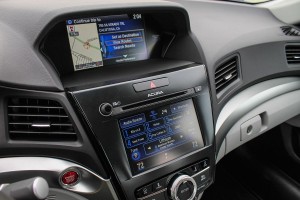
But Benz now sells front-wheel-drive (and front-wheel-drive based) cars like the CLA250. And so, of course, does Audi. BMW is – for now – the only luxury car brand that doesn’t sell a front-wheel-drive (or front-wheel-drive-based) passenger car.
Give it time.
Rear-drive is fun for tail-out drifting and laying rubber but it sucks in winter and it’s not so great in the rain, either. FWD endows a car with bad weather tenacity – and now that the handling stuff has been worked out, you don’t lose much if anything in terms of joy to drive – unless you’re driving on a race track. The handling limits of any new car, whether FWD, RWD or AWD, are very high. Probably you will lose your nerve (or your license) before the car loses grip.
It’s just a shame that Acura decided not to offer its excellent SH-AWD system as an ILX option. That plus maybe another 20 hp or so from the VTEC four… .
THE BOTTOM LINE
The car business is an unforgiving business, but I hope the ILX gets the second chance it deserves. I love the CLA250 for its elegance and style – and the A3 for its brilliant turbo-diesel engine (which – trust me – will better the EPA’s rated mileage figures).
But the ILX offers things neither of them does – for less money. This should not be overlooked.
Or at least, it ought to be considered by anyone considering a car in this class.
If you value independent media, please support independent media!
We depend on you to keep the wheels turning! As you can see from the pie chart (on the main page, top right column) we’re still a little low at the moment. Please help, if you can.
Our donate button is here.
If you prefer to avoid PayPal, our mailing address is:
EPautos
721 Hummingbird Lane SE
Copper Hill, VA 24079
PS: EPautos stickers are free to those who sign up for a $5 or more monthly recurring donation to support EPautos, or for a one-time donation of $10 or more. (Please be sure to tell us you want a sticker – and also, provide an address, so we know where to mail the thing!)




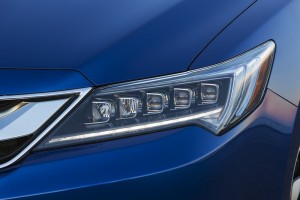
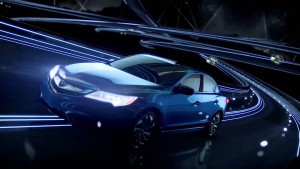
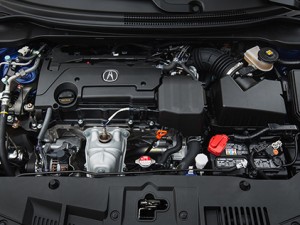
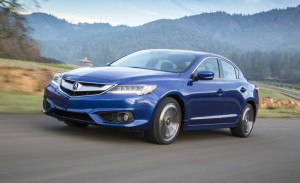

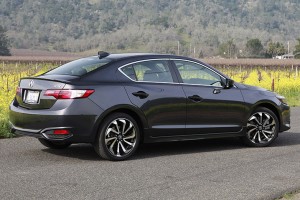







In order for men of exception to get back on the road and out of the ditch they’ve ended up bogged down in. They’re going to have to really get to know each other and help each other in a deeply meaningful way if they want to stop spinning their wheels and get back on track.
Cypher’s Moral Philosophy
https://i.imgflip.com/qi1xe.jpg
What if someone offered you a free extravagant meal every night for life, all you’d have to do is keep tabs on this website and send in a daily report that would require five minutes of your time each day?
What if they offered you twenty thousand dollars. A new Dodge Hellcat. A new home mortgage free. A beautiful nymphomaniac supermodel who can’t speak English and won’t tell anyone what you’re doing with her.
I deFOO from everyone I knew, but I didn’t make Cypher’s bargain. I just walked away and stopped worrying what happened to them, since they didn’t have my back or help me in any way I found meaningful.
Maybe that irrational though. You don’t really have a choice who raises you in some way. Or who you grow up with in childhood. Maybe we could going forward though. Maybe we set up a system where you’re free to find new arrangements at any age. Where giving birth to you doesn’t obligate you to continue to stay somewhere you don’t want to be. There’d be a lot of work to make that happen, though.
The Matrix movie was indirectly funded by a British Commonwealth nation, so in all likehood, it promulgates values that serve that political alliance and not any individual person. The hope is we won’t ask these kinds of questions, so that we accept their artificial matrix as if it was just as real as a river or a forest, when of course, it’s nothing of the kind.
For my purposes, thinking outside the matrix means I have to customize the official lessons of every movie, and every human situation, so that the things I experience might better serve my needs.
That means that Just because we all speak english here, or are all in the same county or neighborhood, it doesn’t necessarily mean we’re going to have each others back if the SHTF. Each of us individually has to decide who are kin is. It isn’t necessarily the kin you’ve been assigned by the central authorities.
I suppose it has to do with how much of an Alpha Dog you think you are, and how true your perception of that status is. If you believe the matrix is in your best interests, then you should work to keep it strong and safe from outsiders.
Clovers, for example, think they’re Alphas just because someone’s told them their membership in the American Gang makes them so. We all know that’s ridiculous. At a minimum, we advocate taking a realist’s view of your political overseers, and do a cost benefit of the whole thing. And ideally, also assess whether you want to be associated with them on moral philosophical grounds.
So what is a valid criteria for Alpha status, then? I would say Eric qualifies, he’s making all this happen. Taking nearly all the risk. Yet he’s still humble and patiently tries to help commentors here to the best of his abilities.
He’s not demanding a steak dinner every night. Just enough sustenance so he doesn’t starve is all he’s asking for. There’s nothing wrong with saying MFFY to those who deserve it. But it would be foolish to miss an opportunity and use it as a knee-jerk life philosophy, without even thinking it through.
Regarding the ‘automated manual trans’:
I own a TDI Beetle, equipped with a DSG trans *(dual clutch auto). With 98k miles on it.
It’s KBB retail value (in excellent condition, grandma owned till I inherited it last year) is $5500.
If that DSG trans fails (and tens of thousands have failed), the repair bill will START at $5500 for a new trans, since it cannot be rebuilt.
So when the whizbang high tech auto trans goes out, the car is scrap. regardless of the life left in the engine or the chassis.
I’m selling it now because of that. Compare it to my Jetta TDI. It’s got 200k on it, on the original clutch. A new clutch (because of the dual mass flywheel) will run me $1200.
The Jetta is worth fixing and owning long term. The Beetle is a time bomb waiting to ruin my year — IE a high tech piece of shit.
At least the older torque converter type automatics were affordable to rebuild.
These new super high tech transmissions are excellent when new, but get back to me at 100k miles and let’s talk about them again.
To me they’re making the cars into fancy Bic Lighters. Once the trans fails, and it surely will long before the rest of the car is worn out, it’s disposable.
If it doesn’t have 3 pedals I am not buying it. Period.
If that means I never buy another new car, then so be it.
One thing I learned from driving beaters for most of my life is how to fix them and keep them running. And I learned not to ever trust automatic transmissions, which have a knack for failing: 1. without warning and 2. at the worst possible time.
You all can keep your super duper dual clutch Ferrari-esque 9 speed race technology automatics.
I’ll keep my M/T and old fashioned clutch pedal.
These new fangled automatics are about as good as lane assist, traction control, backup cameras, and seatbelt buzzers.
Luddites of the world unite!
I agree, Roy…
So does my master mechanic friend, who has dealt with what you’ve just written about. Throw away an otherwise perfectly good car because of the replacement cost of a dead tranny.
I plan to rant more about this soon!
“vs. 25 city, 36 highway for the ILX.
The Benz CLA250 edges out the Acura gas mileage-wise, but just barely. It rates 25 city, 36 highway”
That seems like IDENTICAL numbers. Is this a typo?
“The ILX is Acura’ entry-level, compact luxury-sport sedan. It derives from the Civic, but now has more in common with the high-performance Civic Si.”
This was ripped from the original playbook back when Acura was started.
I had an 87′ Integra(2dr hatch, but they made a 4dr) which had the CRX Si engine in it with a 5 speed and massaged crx/civic suspension. It was an upscale Honda with a performance motor, a bit more refined than any given Si model.
That car was great fun. It handled/braked like a dream, & back in the day could shockingly hang with a Mustang 5.0(stock for stock). You couldn’t pull him, but he couldn’t pull you either. I seem to remember a 6800 redline back then as well. It was good for 125mph (indicated) and took a lot of abuse from me. Four wheel disc brakes were somewhat rare back then too.
It’s good to see them get back to the original formula. Though I always miss manuals, especially with engines that like to rev.
Well Bravo to Acura.
Finally they ditch the hideous front faces that crippled their sales numbers.
And finally, once again, they offer a car with performance dynamics near the front, rather than the back, of the pack.
Acura has reached this high water mark a couple of times in the past. But I think it is something Management has done only in a desperate attempt to lure high rev performance enthusiasts back into the fold. It will work. Unfortunately, Acura will become complacent again.
The default mentality of Acura management is pretentious, metrosexual weirdness. They will revert to it as soon as they can.
What’s your take on the road and wind noise? Some reviewers have made the ILX out to be noisey.
Hi JJ,
This is – my opinion – to a great degree a subjective thing. Like how seats feel (and ride quality). I tend to not notice (or be bothered by) what some might consider “too much” drivetrain/tire/wind noise. This is why – unless it’s extreme and clearly obvious – I tend to suggest a test drive, so that you can decide how it feels (and sounds) to you!
Eric,
If this and the other 3 cars you talk about in the article were all piced equally, which would you buy? You seem to really like the cla.
Hi Ancap,
The CLA is a beautiful car and a top-drawer high-speed cruiser but the back seat is a problem and I would personally dread down-the-road repair costs. The A3 is a great all-arounder and the diesel powered one is almost as economical to drive as a Prius but a lot more fun (and better looking).
The Acura is the hot rod of the bunch – and I would put money on it that the non-turbo engine will be less maintenance-heavy over time than the turbo in the Mercedes. It’s also thousands less to buy – and that would be a big factor me, too.
Where do you rate the IS 250 in this bunch? I’m surprised that a dressed up Civic is sportier than the IS 250, seeing how it is it’s own model rather than a dressed up Corrolla.
Hi Ancap,
The IS250 is something like $8k more to start – and that alone kind of knocks it out of contention. Now, if it offered superior performance, I’d cut it some slack. But it’s the least quick of the group (0-60 in about 7.5 seconds) and it’s also fairly thirsty (21/30).
You can get AWD – but now you’re looking at almost $40k.
It’s a nice car, but it’s (my opinion) overpriced and (fact) slow compared with the others in this class…